August 2023
Treating and Preventing Plantar Warts
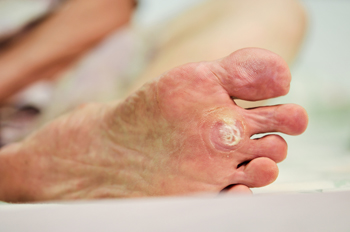
Plantar warts are stubborn growths caused by human papillomavirus, abbreviated HPV, and can be a source of discomfort and frustration. If you are attempting to manage these types of warts, there are effective ways to address them. Over-the-counter treatments containing salicylic acid can help dissolve the warts over time. Alternatively, your podiatrist can use cryotherapy to freeze the warts off. It is important to avoid picking or scratching the warts, as this can spread the virus. To help prevent plantar warts, keep your feet dry and clean, especially in damp environments, such as locker rooms or public showers. Wearing appropriate shoes, such as flip-flops, in communal areas can help to reduce the risk of exposure. If you have developed a plantar wart, it is suggested that you consult with a podiatrist who can guide you toward the treatment method that is right for you.
Plantar warts can be very uncomfortable. If you need your feet checked, contact one of our podiatrists from Coastal Foot & Ankle Wellness Center, LLC. Our doctors will assist you with all of your foot and ankle needs.
About Plantar Warts
Plantar warts are the result of HPV, or human papillomavirus, getting into open wounds on the feet. They are mostly found on the heels or balls of the feet.
While plantar warts are generally harmless, those experiencing excessive pain or those suffering from diabetes or a compromised immune system require immediate medical care. Plantar warts are easily diagnosed, usually through scraping off a bit of rough skin or by getting a biopsy.
Symptoms
- Lesions on the bottom of your feet, usually rough and grainy
- Hard or thick callused spots
- Wart seeds, which are small clotted blood vessels that look like little black spots
- Pain, discomfort, or tenderness of your feet when walking or standing
Treatment
- Freezing
- Electric tool removal
- Laser Treatment
- Topical Creams (prescription only)
- Over-the-counter medications
To help prevent developing plantar warts, avoid walking barefoot over abrasive surfaces that can cause cuts or wounds for HPV to get into. Avoiding direct contact with other warts, as well as not picking or rubbing existing warts, can help prevent the further spread of plantar warts. However, if you think you have developed plantar warts, speak to your podiatrist. He or she can diagnose the warts on your feet and recommend the appropriate treatment options.
If you have any questions please feel free to contact one of our offices located in St. Augustine, and Palatka, FL . We offer the newest diagnostic and treatment technologies for all your foot and ankle needs.
Exploring the Various Types of Foot Orthotics
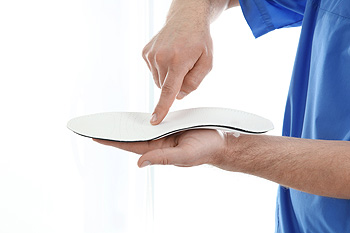
When it comes to promoting optimal foot health and addressing a range of foot-related issues, foot orthotics emerge as a versatile solution. These discreet and personalized devices cater to a variety of needs, with each type serving a unique purpose. Arch supports can offer relief for individuals with fallen arches or over-pronation, and can be successful in correcting alignment and distributing pressure evenly. Heel cups and cushions can help to alleviate heel pain by absorbing shock and reducing impact during movement. Sports enthusiasts often turn to specialized sports orthotics that may enhance performance and minimize discomfort by offering tailored support during athletic activities. For those seeking comfort in everyday life, cushioned insoles provide an extra layer of padding to reduce strain and fatigue. With an array of foot orthotics available, finding the perfect fit for your specific needs has never been more accessible. If you are interested in learning about what type of foot orthotic is right for you, it is suggested that you contact a podiatrist who can provide you with correct information.
If you are having discomfort in your feet and would like to try orthotics, contact one of our podiatrists from Coastal Foot & Ankle Wellness Center, LLC. Our doctors can provide the care you need to keep you pain-free and on your feet.
What Are Orthotics?
Orthotics are inserts you can place into your shoes to help with a variety of foot problems such as flat feet or foot pain. Orthotics provide relief and comfort for minor foot and heel pain but can’t correct serious biomechanical problems in your feet.
Over-the-Counter Inserts
Orthotics come in a wide variety of over-the-counter inserts that are used to treat foot pain, heel pain, and minor problems. For example, arch supports can be inserted into your shoes to help correct overarched or flat feet, while gel insoles are often used because they provide comfort and relief from foot and heel pain by alleviating pressure.
Prescription Orthotics
If over-the-counter inserts don’t work for you or if you have a more severe foot concern, it is possible to have your podiatrist prescribe custom orthotics. These high-quality inserts are designed to treat problems such as abnormal motion, plantar fasciitis, and severe forms of heel pain. They can even be used to help patients suffering from diabetes by treating foot ulcers and painful calluses and are usually molded to your feet individually, which allows them to provide full support and comfort.
If you are experiencing minor to severe foot or heel pain, it’s recommended to speak with your podiatrist about the possibilities of using orthotics. A podiatrist can determine which type of orthotic is right for you and allow you to take the first steps towards being pain-free.
If you have any questions please contact one of our offices located in St. Augustine, and Palatka, FL . We offer the newest diagnostic and treatment technologies for all your foot and ankle needs.
Unraveling the Causes of Bunions
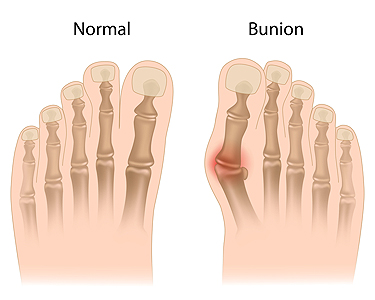
Bunions, also known as hallux valgus, are bony bumps that form at the base of the big toe. This condition occurs when the big toe pushes against the adjacent toe, causing the joint to move out of alignment. There are various reasons why bunions can develop. Genetics play a significant role, as individuals with a family history of bunions are more likely to develop them. Wearing ill-fitting shoes, especially those with narrow toe boxes, can exacerbate the condition. As bunions progress, symptoms become more pronounced. Common signs include pain, swelling, redness, and stiffness around the affected joint. Corns and calluses may develop due to friction from overlapping toes. As a bunion worsens, the shape of the foot may change, possibly affecting balance and walking patterns. Early detection and appropriate measures, such as wearing supportive footwear and using padding or orthotic inserts, can help manage symptoms and prevent further deformity. If you have a bunion, it is strongly suggested that you visit a podiatrist who can provide you with relief and treatment options that are right for you.
If you are suffering from bunions, contact one of our podiatrists of Coastal Foot & Ankle Wellness Center, LLC. Our doctors can provide the care you need to keep you pain-free and on your feet.
What Is a Bunion?
A bunion is formed of swollen tissue or an enlargement of boney growth, usually located at the base joint of the toe that connects to the foot. The swelling occurs due to the bones in the big toe shifting inward, which impacts the other toes of the foot. This causes the area around the base of the big toe to become inflamed and painful.
Why Do Bunions Form?
Genetics – Susceptibility to bunions are often hereditary
Stress on the feet – Poorly fitted and uncomfortable footwear that places stress on feet, such as heels, can worsen existing bunions
How Are Bunions Diagnosed?
Doctors often perform two tests – blood tests and x-rays – when trying to diagnose bunions, especially in the early stages of development. Blood tests help determine if the foot pain is being caused by something else, such as arthritis, while x-rays provide a clear picture of your bone structure to your doctor.
How Are Bunions Treated?
- Refrain from wearing heels or similar shoes that cause discomfort
- Select wider shoes that can provide more comfort and reduce pain
- Anti-inflammatory and pain management drugs
- Orthotics or foot inserts
- Surgery
If you have any questions, please feel free to contact one of our offices located in St. Augustine, and Palatka, FL . We offer the newest diagnostic and treatment technologies for all your foot care needs.
Understanding Clubfoot in Infants
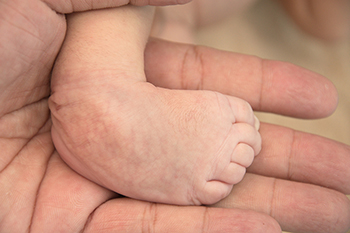
Clubfoot, a congenital condition affecting approximately 1 in 1,000 births, is characterized by a child's foot turning inward and downward. It is primarily caused by a shortened Achilles tendon, resulting in misaligned bones in the foot. While about half of the affected children have bilateral clubfoot where both feet are impacted, prompt treatment is essential to avoid lifelong disability and walking difficulties. The leading cause of clubfoot is believed to be a combination of genetic and environmental factors. A family history of the condition increases the risk of clubfoot, but it can also occur without any prior family instances. Additionally, certain risk factors such as gestational diabetes, smoking, and drinking during pregnancy, can contribute to its development. Most cases of clubfoot can be successfully treated without surgery using the Ponseti method, involving progressive casting and bracing. However, severe cases may necessitate surgical intervention, which is considered a last resort. If your infant was born with clubfoot, it is strongly suggested that you make an appointment with a podiatrist immediately for early intervention and individualized treatment.
Congenital foot problems require immediate attention to avoid future complications. If you have any concerns, contact one of our podiatrists of Coastal Foot & Ankle Wellness Center, LLC. Our doctors can provide the care you need to keep you pain-free and on your feet.
Congenital foot problems are deformities affecting the feet, toes, and/or ankles that children are born with. Some of these conditions have a genetic cause while others just happen. Some specific foot ailments that children may be born with include clubfeet, polydactyly/macrodactyly, and cleft foot. There are several other foot anomalies that can occur congenitally. What all of these conditions have in common is that a child may experience difficulty walking or performing everyday activities, as well as trouble finding footwear that fits their foot deformity. Some of these conditions are more serious than others. Consulting with a podiatrist as early as possible will help in properly diagnosing a child’s foot condition while getting the necessary treatment underway.
What are Causes of Congenital Foot Problem?
A congenital foot problem is one that happens to a child at birth. These conditions can be caused by a genetic predisposition, developmental or positional abnormalities during gestation, or with no known cause.
What are Symptoms of Congenital Foot Problems?
Symptoms vary by the congenital condition. Symptoms may consist of the following:
- Clubfoot, where tendons are shortened, bones are shaped differently, and the Achilles tendon is tight, causing the foot to point in and down. It is also possible for the soles of the feet to face each other.
- Polydactyly, which usually consists of a nubbin or small lump of tissue without a bone, a toe that is partially formed but has no joints, or an extra toe.
- Vertical talus, where the talus bone forms in the wrong position causing other bones in the foot to line up improperly, the front of the foot to point up, and the bottom of the foot to stiffen, with no arch, and to curve out.
- Tarsal coalition, when there is an abnormal connection of two or more bones in the foot leading to severe, rigid flatfoot.
- Cleft foot, where there are missing toes, a V-shaped cleft, and other anatomical differences.
- Macrodactyly, when the toes are abnormally large due to overgrowth of the underlying bone or soft tissue.
Treatment and Prevention
While there is nothing one can do to prevent congenital foot problems, raising awareness and receiving neonatal screenings are important. Early detection by taking your child to a podiatrist leads to the best outcome possible.
If you have any questions please feel free to contact one of our offices located in St. Augustine, and Palatka, FL . We offer the newest diagnostic tools and technology to treat your foot and ankle needs.
Reminder: When Was the Last Time...?
How to Practice Everyday Foot Care
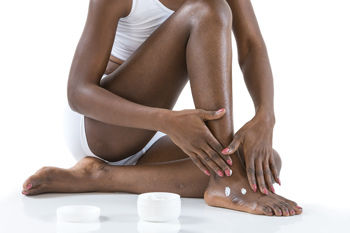
The feet are often taken for granted, and they are sometimes a part of the body that gets the least respect. The feet are most likely to get injured from absorbing the body’s weight. They are responsible for various things, including providing us with mobility and balance. Many people wear shoes that do not fit correctly, and part of a good everyday foot care routine is to choose shoes that fit well. The day can begin by washing and drying the feet thoroughly, followed by applying a good moisturizer. It is beneficial to alternate pairs of shoes worn each day, and this can provide an opportunity to air the shoes out. Additionally, limiting the time flip-flops are worn can help the arch of the foot. Women who are pregnant may find their feet become swollen, and relief may be found when the feet are frequently elevated. If you would like additional tips on everyday foot care, it is suggested that you consult a podiatrist who can provide you with useful information.
Everyday foot care is very important to prevent infection and other foot ailments. If you need your feet checked, contact one of our podiatrists from Coastal Foot & Ankle Wellness Center, LLC. Our doctors can provide the care you need to keep you pain-free and on your feet.
Everyday Foot Care
Often, people take care of their bodies, face and hair more so than they do for their feet. But the feet are a very important aspect of our bodies, and one that we should pay more attention to. Without our feet, we would not be able to perform most daily tasks.
It is best to check your feet regularly to make sure there are no new bruises or cuts that you may not have noticed before. For dry feet, moisturizer can easily be a remedy and can be applied as often as necessary to the affected areas. Wearing shoes that fit well can also help you maintain good foot health, as well as making it easier to walk and do daily activities without the stress or pain of ill-fitting shoes, high heels, or even flip flops. Wearing clean socks with closed shoes is important to ensure that sweat and bacteria do not accumulate within the shoe. Clean socks help to prevent Athlete’s foot, fungi problems, bad odors, and can absorb sweat.
If you have any questions please feel free to contact one of our offices located in St. Augustine, and Palatka, FL . We offer the newest diagnostic and treatment technologies for all your foot and ankle needs.








